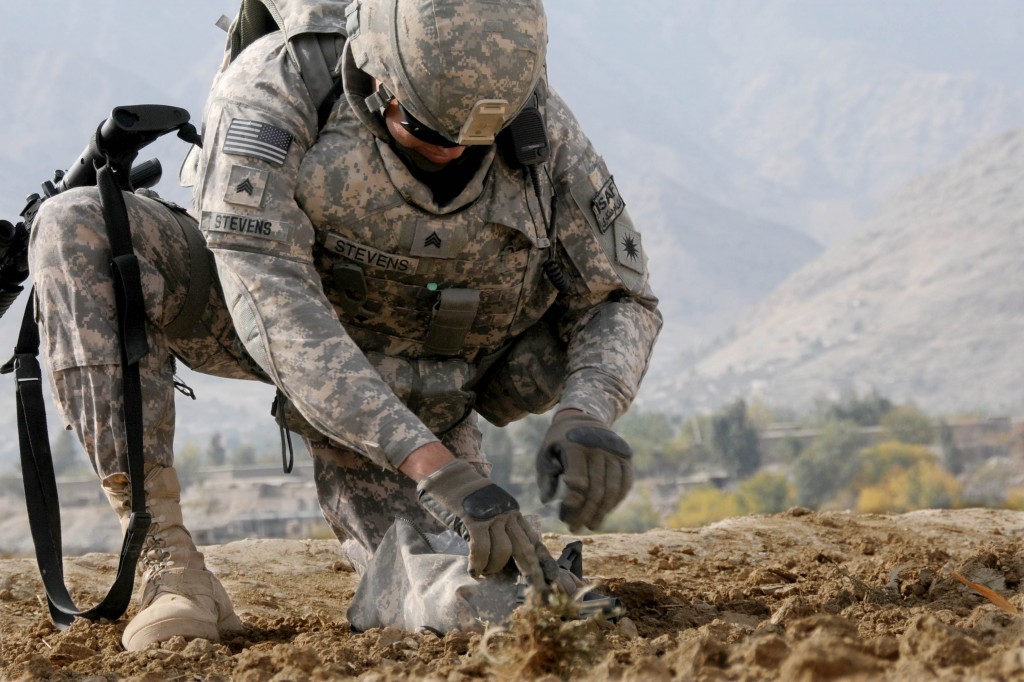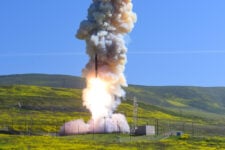
A California National Guard soldier in Afghanistan.
WASHINGTON: Late Friday, the powerful National Guard Association of the US escalated the already bitter conflict between the Guard community and regular Army leaders by another notch — and they did so in response to something an Army general told Breaking Defense.
On Tuesday, Breaking Defense published an interview I’d done with Maj. Gen. John Rossi, the regular Army’s Quadrennial Defense Review director, about the limitations of the National Guard. (Click here to read that story). What Rossi said was provocative, and many in the Guard community (though by no means all) have taken it as an insult to their institution and their service. “NGAUS has heard from countless members who were deeply saddened or stung by the comments,” a National Guard Association spokesman told me. “Your story Thursday [on the reaction to Rossi] included a tiny fraction of what we heard.”
Here’s how NGAUS’s president, retired Maj. Gen. Gus Hargett (who is a frequent presence on this website) chose to put it on his blog on Friday afternoon:
The general told breakingdefense.com that much of the praise Guard brigade combat teams have received since 9/11 is misplaced. He said Guard brigades in Iraq and Afghanistan were primarily assigned less-complex missions while the active component did the heavy lifting…..
But that he so egregiously spun the facts to make his case—failing to explain, among other things, that every Guard brigade that deployed met training standards Army leaders set—is only part of the problem.
General Rossi’s words were gasoline thrown on the already simmering relations between Army leaders and the Army Guard. They cast the Guard as a second-rate fighting force, which was insulting and shocking to a generation of Guard soldiers who thought Army leaders valued their service. The damage done is incalculable.
The immediate irony is that Hargett is throwing gas on the fire himself. That is clearly a strategic choice.
The National Guard Association worked quietly for most of the last year. In January, however, as the administration finalized a 2015 budget request that did indeed cut the Guard, NGAUS decided the inside approach had failed — “the ailment is no longer treatable from within,” to quote Hargett’s Friday blog — and it opened fire publicly and personally at Army Chief of Staff Ray Odierno. NGAUS is now lobbying Congress to reject the cuts and create an independent commission to settle the matter. That campaign requires emotionally mobilizing NGAUS members and the general public to pressure the Hill.
Unfortunately, in the process, facts sometimes get lost.
Yes, Rossi did say most (not all) Guard brigade combat teams were assigned missions that required less sophisticated tactical planning, coordination, and execution across the brigade as a whole: missions such as securing supply routes or training and advising local forces, rather than conducting the full scope of counterinsurgency operations in all their complexity.
But Rossi also made clear that he considered those missions “important” and “dangerous,” that the Guard performed them well, and that Guard soldiers as individuals served with the same professionalism as their regular active-duty counterparts.
Rossi said the difference was that, compared to the active duty force, Guard units had less time to train together as units, especially on the higher levels of battalion and brigade. That meant the Army had a choice (and he never denied it was the Army’s choice, not the Guard’s). They could spend more of a Guard unit’s time after mobilization to train it to the highest levels of brigade-level operations, or they could deploy it more quickly and for a longer time on missions which were still essential and demanding but which required less of the brigade leadership and their staffs.
So is Rossi implying the Guard is a “second-class force”? In this one specific area, which has major implications for the budget, he certainly seems to be. Across the board? Absolutely not.
Did Rossi say the missions that the Guard did get were not “heavy lifting”? No. In fact, in some cases, units doing convoy escort and route security took higher casualties than the ones engaged in full-scale counterinsurgency, which could often take the offensive and fight the enemy on their own terms rather than getting ambushed on predictable highway routes.
So should Guard soldiers feel “insult[ed] and shock[ed]” and decide that regular Army leaders never “valued their service”? Not based on anything Rossi said, both in my analysis and in that of many of the current and former Guard personnel who commented on the story, either online or to me personally.
The National Guard Association, naturally, disagrees: “General Hargett did not misread General Rossi’s message, which was masterfully calibrated to help burnish the active-component Army agenda to receptive congressional staffers,” the NGAUS official told me when I raised my concerns. “The bulk of the National Guard community also saw through the compliments.”
Rossi’s carefully chosen words to me, NGAUS says, have to be taken in the context of what Hargett’s post called a “scorched-earth communications campaign” by the Army against the National Guard, mostly behind closed doors. “This campaign has been underway for months on Capitol Hill,” the NGAUS official said. “It only recently has included an appeal to the press.”
Rossi has been a point man in this Army offensive, NGAUS says, and soon, according to an email they provided, Rossi will visit at least some governors to explain how the Army budget — including the Guard cuts — impacts their states.
I certainly have heard regular Army officers and retirees speak ill of the Guard. I’ve heard at least as many in the Guard community speak ill of the active-duty force. It can get ugly. What I have not heard is any such ugliness from Maj. Gen. Rossi.
Rossi made a reasonable, fact-based, and cautious case in his on-the record remarks, which deserve a reasonable, fact-based, and cautious rebuttal. There is a real debate here: strategically complex, politically sensitive, and understandably emotional. But nevertheless, as I’ve written from the beginning, there can and should be a rational compromise.
Move over FARA: General Atomics pitching new Gray Eagle version for armed scout mission
General Atomics will also showcase its Mojave demonstrator for the first time during the Army Aviation Association of America conference in Denver, a company spokesman said.


























